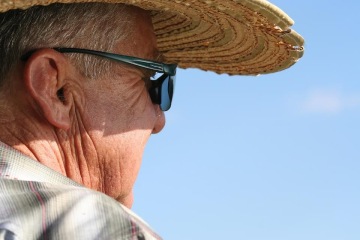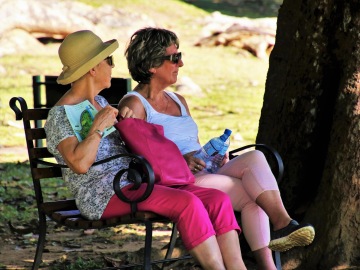Hot weather is a serious threat to a seniors - protect them
August 5, 2019

As we are deep in the summer season in the Northern hemisphere, we’re facing relentlessly hot days. Older people, young children and people with pre-existing medical conditions are most at risk of suffering from heat-related illnesses. Therefore, especially during the summertime and the accompanying heat waves, we must help our seniors manage the heat and sun. Read on to learn more about the possible complications of too much heat in order to recognize them early and take the appropriate measures.
According to the Centers for Disease Control and Prevention (CDC), above average temperatures or unusually humid weather kills more than 600 people in the United States each year. And we may face more days of excessive heat.
The WHO shows that extreme temperature events are observed to be increasing in their frequency, duration, and magnitude. Between 2000 and 2016, the number of people exposed to heat waves increased by around 125 million.
As caregivers, we must be aware of the numerous health risks posed by heat waves in order to best take care of our elderly loved ones.
Prevention is key to protecting seniors from heat exhaustion
There are many important indications to avoid any potential heat-related illnesses that may affect the elderly. WebMD offers a list of preventive action that we must know as caregivers:
- Staying in a cool location with continuous access to fluids.
- Avoiding caffeine and alcohol because can make the body lose more fluids.
- Using sunscreen to protect skin from sun exposure.
- Keeping the body cool with lightweight and light-colored, loose clothing.
- Doing any exercise or physical activity when the air is colder, preferably early in the morning or evening.
- Staying indoors when the sun is the highest to prevent heatstroke.

Seniors should stay indoors when the sun is the strongest. And if they can’t or don’t want to they should at least wear a hat and drink a lot of water.
Know the symptoms of various heat-related illnesses
It’s important to be watchful of our seniors during hot days. Serious consequences may occur as a result of prolonged exposure to high temperatures. Learn more about the most common illnesses that can affect us when exposed to heat:
- Heat rash – condition in which areas of your skin feel prickly or sting due to overheating. Very itchy but generally not dangerous.
- Heat cramps – painful, brief muscle cramps. Muscles may spasm or jerk involuntarily. Heat cramps can happen during exercise or when working in a hot environment.
- Heat exhaustion – There are two types of heat exhaustion: Water depletion which may cause excessive thirst, weakness, headache, and loss of consciousness, and salt depletion which causes nausea and vomiting, muscle cramps, and dizziness.
- Heat stroke (also known as sunstroke) – a life-threatening, medical emergency. Symptoms are similar to those of heat exhaustion but rapidly worsen over time and result in unconsciousness, organ failure and death. Immediately call emergency medical services.
Treat your senior as soon as you see signs of overheatedness
Although each illness requires its own treatment plan, there are a few vital steps we can take to ease symptoms and aid recovery:
- The number one step is to immediately get to a cooler place and start applying cooling measures to remove the heat from the body.
- Drinking water is absolutely crucial to helping the body recover from the heat. Sports drinks such as Gatorade may also be used to replace lost salt.
- Wet towels, fans, ice can all be applied to the body for a quicker cool-down.

Older skin is even more vulnerable. Don’t forget to use sunscreen.
Let’s take extra steps to help our seniors
As caregivers, our job is to provide the best quality care for our seniors and the WHO gives us a few useful tips on how to be prepared for anything that may occur:
- Check on family and friends who spend much of their time alone, they might need assistance during a heatwave.
- Elderly or sick people living alone should be visited at least daily. Help anyone at risk.
- If a person is taking medication, learn how it can influence their body function in a hot season.
- Take a first-aid course to learn how to treat others in case of an emergency.
Staying connected is key to helping our seniors through a heatwave
As global temperatures rise, we can expect more persistent heat waves. We need to prepare for any challenges that may arise. Being informed and staying vigilant are essential to protecting our seniors from the adverse effects of hot weather. Connecting to them as often as possible keeps them safe and secure if they are living alone. Making it easy to contact you in case they feel unwell may be life-saving. An online communication platform built for specific needs of elderly persons such as Oscar Senior, is a great way to connect and check up on your elderly loved ones easily at a distance.
